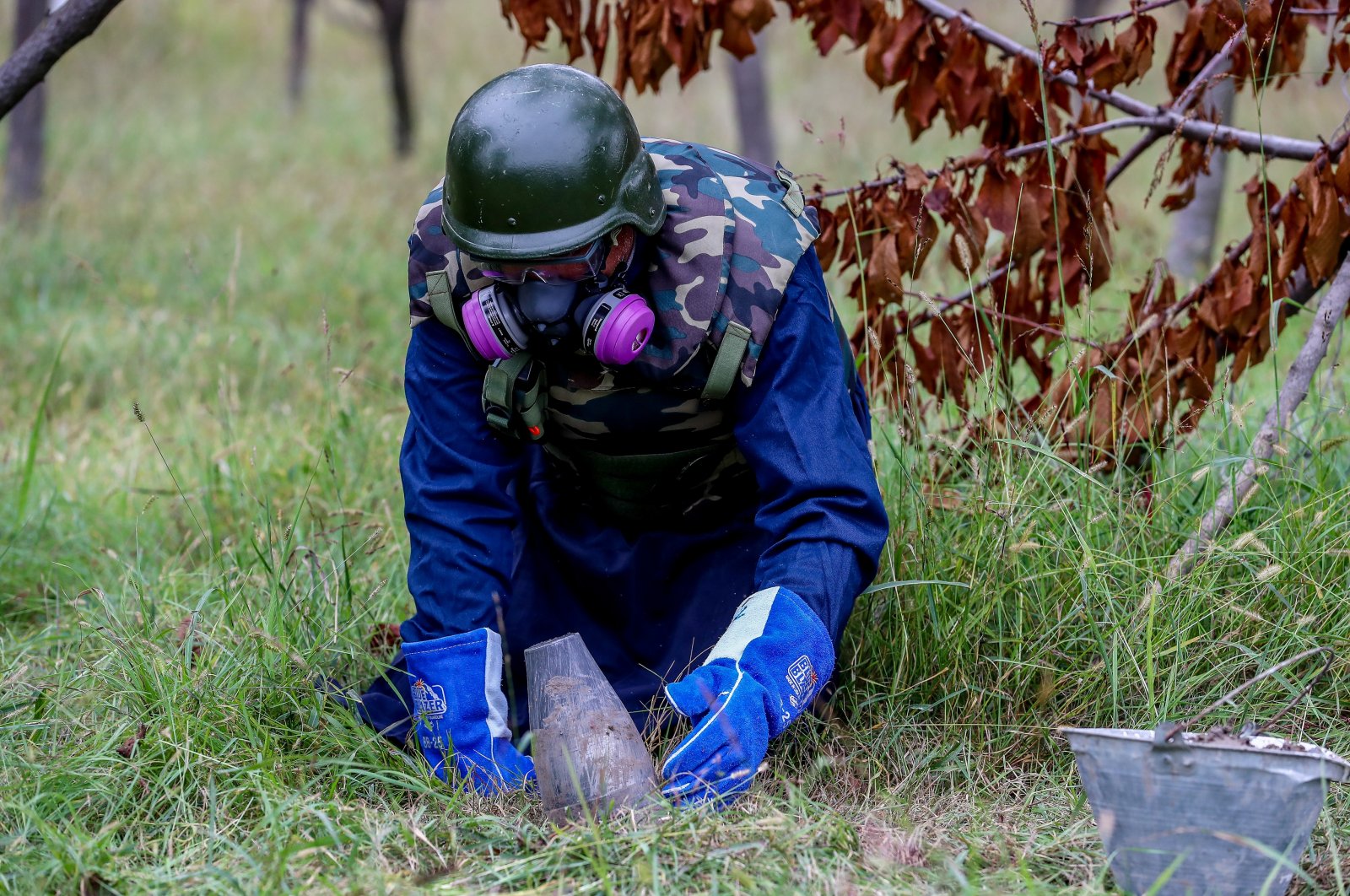
Azerbaijan has disabled more than 158,000 land mines and other unexploded explosives Armenian separatists planted during their three decades of occupation of Karabakh, according to official figures.
The two former Soviet republics had seen decades of war and tension over Karabakh, a mountainous area that is internationally recognized as part of Azerbaijan, illegally seized by ethnic Armenian separatists over three decades ago.
The Azerbaijan Mine Clearance Agency (ANAMA), in cooperation with Azerbaijani armed forces, has been conducting an operation using cutting-edge equipment to locate and defuse explosives that are endangering the lives of innocent people as well as army units deployed in liberated Karabakh and surrounding territories.
Since the end of the Second Karabakh War in November 2020, Azerbaijani authorities have scanned and demined 162,000 hectares of land in the region. These were 104,000 unexploded ammunition, more than 33,000 antipersonnel mines and over 20,000 anti-tank mines.
Land mines in Karabakh have also killed 70 Azerbaijani citizens and injured 309 people since the end of the war.
Azerbaijan’s traditional ally, Türkiye, also supports the demining efforts in Karabakh. Azerbaijani forces are using 20 demining vehicles manufactured by Türkiye’s Defense Ministry.
Planting land mines constitutes a serious violation of fundamental norms and principles of international humanitarian law, including the 1949 Geneva Convention. Armenia laid hundreds of thousands of land mines in violation of international conventions to keep the occupied territories.
Completely clearing mines that have been planted by Armenia on occupied Azerbaijani territories will take nearly 30 years and cost $25 billion, according to Azerbaijani President Ilham Aliyev.
After a series of slow-moving negotiations, Azerbaijan rushed in troops last year September and swiftly seized back Karabakh, whose entire population of nearly 120,000 people returned to Armenia after rejecting a reintegration program Baku offered.
Baku and Yerevan are currently working to sign a peace treaty, which they say is 80% complete, including border delineation, to end the decadeslong dispute over the enclave, but there are still several stumbling blocks in negotiations, namely transport routes and constitutional claims.
Last month, Armenian Prime Minister Nikol Pashinyan said Yerevan was ready to meet Baku’s key demand of allowing transportation access across Armenian soil to the exclave of Nakhchivan, letting Azerbaijan connect its main territory with Türkiye.
"The Republic of Armenia is ready to fully ensure the safety of the passage of cargo vehicles and people on its territory. It is our wish, our commitment, and we can do it," Pashinyan said in remarks that could turn the page on decades of conflict.
Baku, however, insists reaching a peace agreement with Armenia is impossible until Armenia removes from its Constitution a problematic reference to the country's 1991 declaration of independence from the Soviet Union, which proclaims Armenia's unification with Karabakh as a national goal.
Pashinyan said that Armenia had its own issues with Azerbaijan's Constitution but that it did not see any obstacle as a peace agreement "solves the problem."
Some diplomats accuse Aliyev of holding a "cynical stance,” claiming Pashinyan would have difficulty changing the Constitution.
The diplomats say Azerbaijan believes it can afford to wait as it has the clear upper hand, with its wealth from gas, a modernized military bolstered by Turkish weapons and a rising international profile, with Baku in November, the host of the COP29 climate summit.
Pashinyan insisted that Azerbaijan and Armenia should sign the draft treaty immediately, arguing, "There is no precedent of a peace agreement or any agreement that would regulate and solve everything."
‘Armenia must apologize’
Aliyev appeared unmoved as he called on Armenia to "apologize for all the crimes it committed on Azerbaijani lands during the occupation.”
In a letter to the International Ombudsmen Forum in Baku on Wednesday, Aliyev said the "heavy consequences” of Armenia’s occupation of Karabakh continued and posed a "major threat” to the people and environment.
"Armenia, for a long time, committed ecological, urban and cultural massacres on our lands,” Aliyev said.
He accused Armenia of "polluting our rivers and soil, destroying our forests, cities, villages and religious and cultural monuments and mining our lands” in Karabakh.
"Armenia refuses to give clear information about people that went missing during the First Karabakh War and the exact locations of mass graves. They must apologize for all these crimes,” he said.
